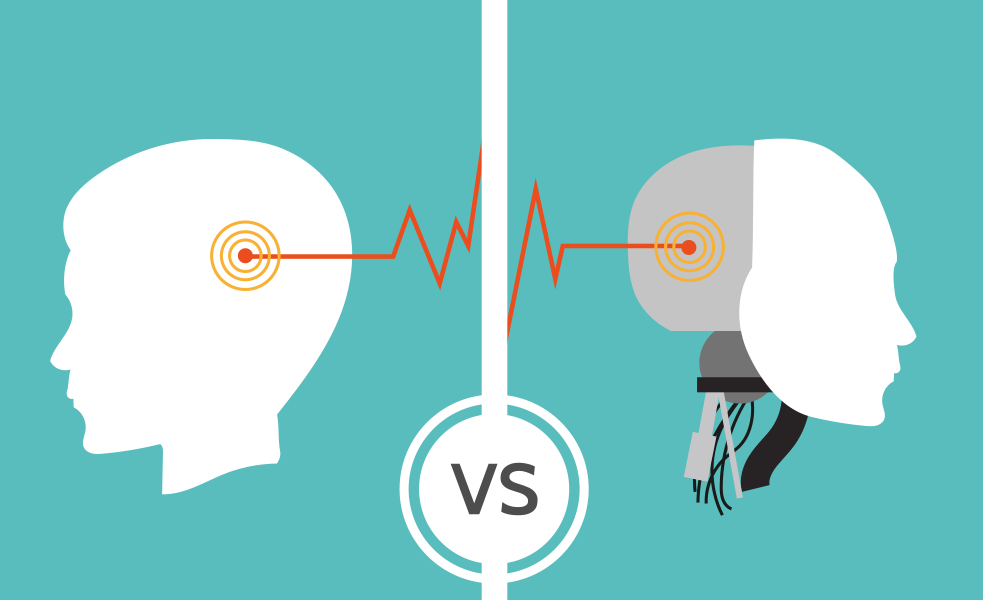
AI + IQ Testing: The Rise of Artificial Intelligence in Cognitive Assessments
Welcome to a captivating journey into the realm of AI and IQ testing. In this blog, we bring you an in-depth exploration of the groundbreaking research conducted by AI expert and consultant, Dr. Alan D. Thompson. With a distinguished background as the former Chairman for Mensa International, Alan has been at the forefront of revealing the IQ of post-2020 AI models.
Join me as we dive into the remarkable statistics, notable events, and thought-provoking insights that Alan has uncovered in this fast-paced AI revolution.
Viz: Visualizing the Advancements
Get ready for an exciting treat! Introducing the electrifying GPT-4 vs. human visualization in a simplified format:
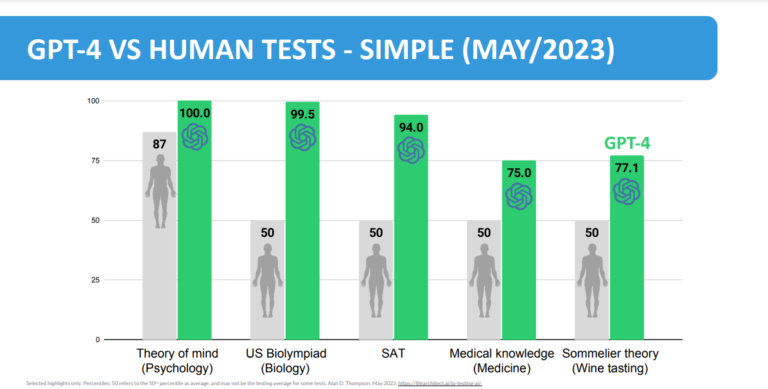
Download PDF here and let the electrifying knowledge flow through you!
More accurate results through various test subjects:
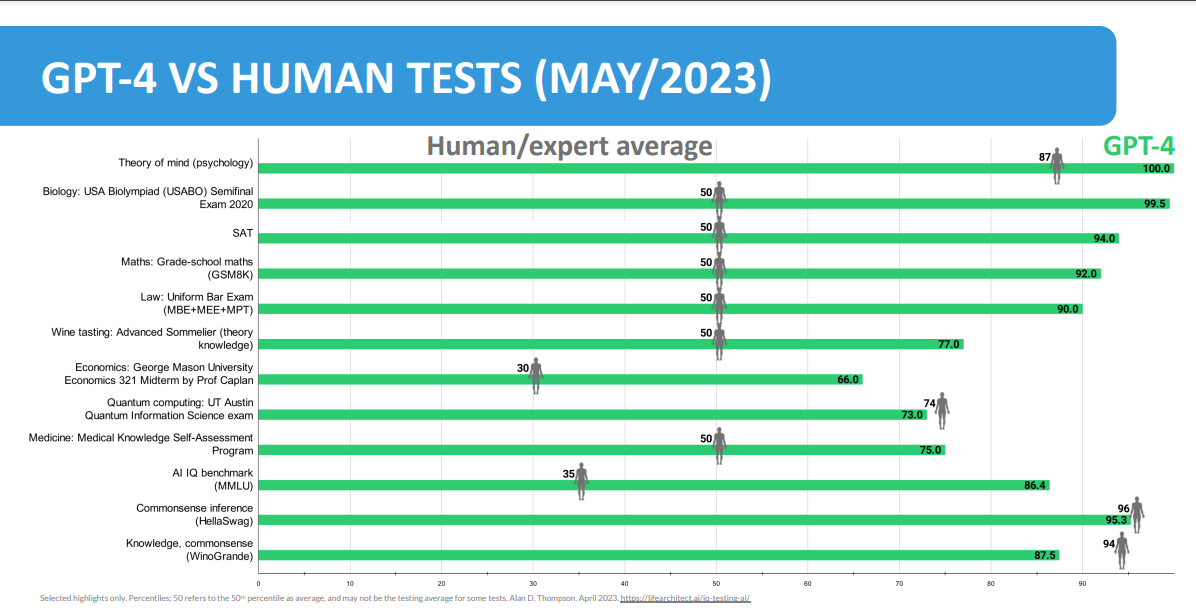
Reference: https://s10251.pcdn.co/pdf/2023-Alan-D-Thompson-GPT-4-Tests-Rev-3.pdf
Fascinating, isn’t it? There’s more.
In November 2022, a comparison was conducted between human responses and those generated by several language models, including ChatGPT-3, PaLM 540B, Minerva 540B, and Flan-PaLM540B, as part of a series of language model tests. Here are the results:
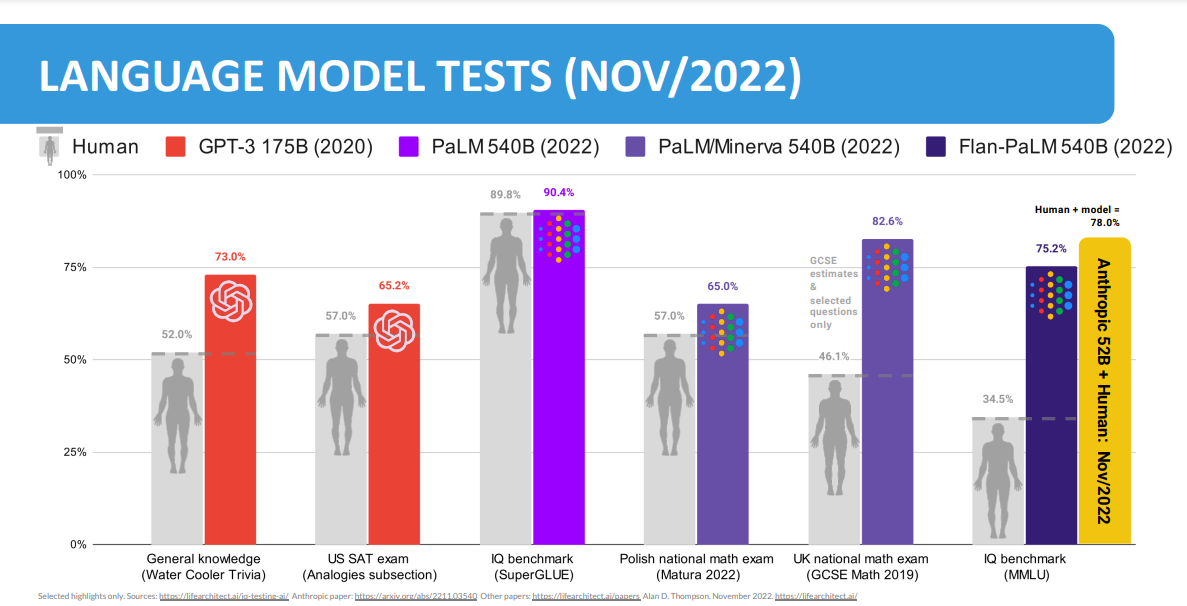
Tests and Trivia:
In an article written by Collin Waldoch, co-founder of the online trivia platform Water Cooler Trivia, a comparison was made between human participants and the AI language model GPT-3 in a trivia showdown.
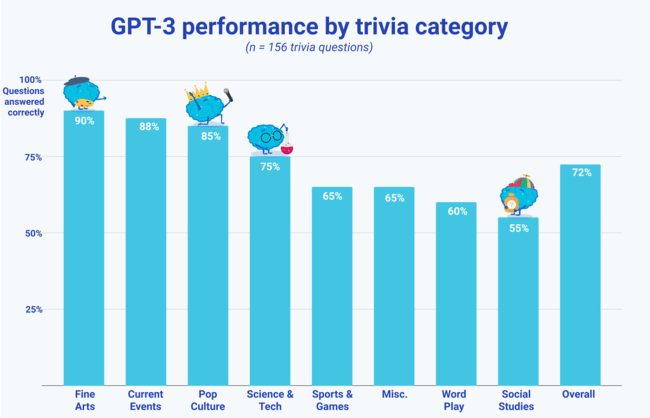
Prepare to be amazed by the results:
Humans scored 52%, GPT-3 achieved an impressive 73%, and J1 scored 55.4%.
These numbers give us a thrilling glimpse into the capabilities of AI when it comes to IQ-related tasks.
Notable Events in IQ Testing AI Models:
The below table summarizes significant events in IQ testing involving AI models. Each row represents a specific event, including the date, a brief summary of the achievement, the corresponding score or performance, and the model involved:
Date | Summary | Score | Human (%) | Model |
May/2023 | PaLM 2 shatters barriers on WinoGrande, surpassing the 90% mark on this challenging test | 90.9% | 94% | PaLM 2 |
May/2023 | GPT-4 achieves a ceiling accuracy of 100% in Two-Shot CoT plus SS Thinking scenarios at Johns Hopkins | 100% | 87% | GPT-4 |
Mar/2023 | GPT-4 showcases exceptional intelligence with an IQ score of 152 on a Verbal-Linguistic IQ Test | 152 | – | GPT-4 |
Mar/2023 | GPT-4 outperforms humans across various exams | – | – | GPT-4 |
Feb/2023 | Stanford’s text-davinci-003 model solves 93% of theory of mind tasks, comparable to the cognitive abilities of nine-year-old children | – | – | Stanford Model |
Feb/2023 | Kosmos-1 performs visionary tasks on Raven’s IQ tests | – | – | Kosmos-1 |
Jan/2023 | ChatGPT achieves an outstanding IQ score of 147 on a Verbal-Linguistic IQ Test | 147 | – | ChatGPT |
Dec/2022 | GPT-3.5 surpasses humans in symbolic Raven’s IQ tests | – | – | GPT-3.5 |
As we reflect on these remarkable achievements, it’s evident that AI is not only catching up to human intelligence but also redefining what we perceive as intelligence itself. The future holds infinite possibilities as AI continues to evolve and surpass our expectations.
So, brace yourselves for an era of unprecedented advancements and mind-boggling achievements in AI-driven IQ testing. The journey has just begun, and we are on the brink of unlocking the full potential of artificial intelligence.
But let’s not forget the incredible achievements within the realm of AI-driven IQ testing that have already taken place.
Delve Deeper into ChatGPT’s Achievements
ChatGPT, for instance, has showcased outstanding capabilities that leave us in awe. To delve deeper into its achievements, explore the comprehensive data presented by Alan:
Captivating Experiment: Leta AI and the Binet (1905) Test
Furthermore, in a captivating and fun experiment, Leta AI explored an early version of the Binet (1905) test. Although informal and involving only a small selection of questions, this experiment provided intriguing insights into AI’s capabilities in tackling cognitive assessments.
Appreciating the Trailblazing Work of Dr. Alan D. Thompson
Amidst these groundbreaking developments, it’s important to appreciate the trailblazing work of Dr. Alan D. Thompson. As an esteemed AI expert and consultant, he has advised Fortune 500 companies and governments on the potential of post-2020 large language models. His contributions have been recognized and featured at prestigious institutions such as NYU, Microsoft AI, and Google AI.
With his extensive expertise and memberships in esteemed organizations like IEEE and IET, Dr. Thompson continues to push the boundaries of AI and pave the way for its remarkable advancements.
Closing:
In conclusion, the remarkable advancements in AI and IQ testing have propelled us into a new era of understanding and exploration. Driven by the groundbreaking work of experts like Dr. Alan D. Thompson, we’ve witnessed AI models surpassing human performance in various cognitive tasks, achieving astonishing IQ scores, and demonstrating extraordinary cognitive abilities.
Don’t miss out on the latest developments in AI and intelligence testing! Visit us for AI CEO Consulting services, where you can dive into more in-depth analyses, gain valuable insights, and join a community of like-minded individuals passionate about the intersection of AI and human intelligence.
FAQs
AI-driven IQ testing refers to the use of artificial intelligence technology to assess and measure cognitive abilities, including intelligence, problem-solving, and reasoning skills. It involves the application of AI models and algorithms to perform tasks traditionally associated with human intelligence tests.
AI has shown remarkable progress in IQ testing, often surpassing human performance in specific tasks. For example, in trivia tests, AI language models like GPT-3 have achieved impressive scores, with GPT-3 scoring 73% compared to humans’ 52%. Additionally, AI models like GPT-4 have achieved IQ scores in the 99.9th percentile, showcasing their exceptional cognitive abilities.
Some notable achievements include PaLM 2 breaking the 90% mark on the challenging WinoGrande test, GPT-4 achieving a ceiling accuracy of 100% in Two-Shot CoT plus SS Thinking scenarios, and GPT-4 outperforming humans across various exams. These achievements highlight the potential of AI models to excel in IQ testing and push the boundaries of human capabilities.
ChatGPT has demonstrated outstanding capabilities in IQ testing, achieving an impressive IQ score of 147 on a Verbal-Linguistic IQ Test. This places ChatGPT in the 99.9th percentile, showcasing its potential to excel in language-based cognitive tasks.
The Binet (1905) test is a historically significant cognitive assessment tool used to measure intelligence. Leta AI’s experiment, exploring an early version of the Binet test, provides intriguing insights into AI’s capabilities in tackling cognitive assessments. Although informal and involving a small selection of questions, the experiment sheds light on AI’s potential in cognitive testing.
Dr. Alan D. Thompson is an AI expert and consultant who has advised Fortune 500 companies and governments on post-2020 large language models. He has made significant contributions to the field of AI and has been recognized at prestigious institutions such as NYU, Microsoft AI, and Google AI. Dr. Thompson’s work continues to push the boundaries of AI and drive advancements in the field.
To stay updated on the latest developments, you can visit aiceoconsultant.com, where you can explore in-depth analyses, gain valuable insights, and join a community of individuals passionate about AI and human intelligence. Following AI-related news outlets, academic research, and AI conferences can also help you stay informed about the latest advancements in the field.
